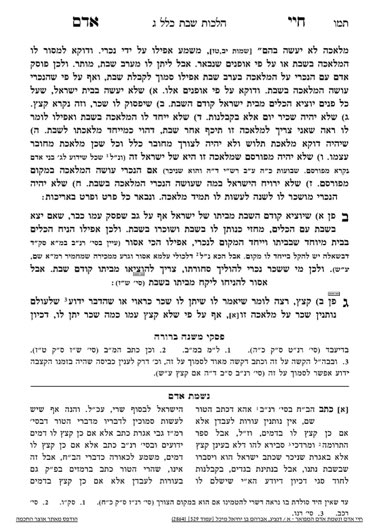We are continuing in siman 3. The Chayei Adam is discussing the second criterion for it to be permitted to make an arrangement with a non-Jew before Shabbos regarding melacha on Shabbos, which is that the non-Jew must be paid. The Chayei Adam will discuss a detail regarding the arrangement.
We learned that it is assur for a non-Jew to work for free if the Jew was the one who initiated the arrangement. It is only muttar when the non-Jew offers on his own. The question is that either way, if the fact that the non-Jew is willing to do the work without payment is muttar because he is doing it for his own benefit rather than the Jew’s, why should it be any different whether the non-Jew initiated or the Jew initiated? The Chayei Adam explains that when the Jew initiates it, even though the non-Jew only agrees because he receives some benefit, it still creates a relationship between the Jew and non-Jew in a way which makes it appear as though the non-Jew is a shliach of the Jew. The can be misinterpreted, either as maris ayin, or in that it eventually undermines kedushas Shabbos, as we learned previously (S0060-61).
Either way, the Chayei Adam writes that the issue of a Jew initiating the arrangement without pay is only an issue if the arrangement took place on erev Shabbos, and there is not enough time to finish the work before Shabbos. If there is time to complete it before Shabbos, even if the non-Jew decides to wait and perform the melacha on Shabbos itself, we cannot say it is an issue of the non-Jew appearing to be the shliach of the Jew, because the non-Jew chose to perform the melacha on his own volition. (This is all in a scenario where the non-Jew is a kablan, a contractor. If he is a salaried worker, it is assur even if he here chose to work on Shabbos on his own.)
Furthermore, the Chayei Adam writes that if the arrangement was made earlier in the week, even if the work could not be completed before Shabbos, it is muttar (again, only in conjunction with being a kablan). The Chayei Adam explains that since the arrangement took place earlier in the week, it does not appear to be an arrangement specifically regarding Shabbos, so the non-Jew does not appear to be a shliach of the Jew. Thus, we see that the idea of the non-Jew appearing like the shliach of the Jew only applies on erev Shabbos when it is clear that there is not enough time to finish the melacha before Shabbos.
The Chayei Adam adds the caveat that if the melacha is clearly for a Jew, for example, the non-Jew is fixing a clearly Jewish item, one must be machmir even if the arrangement was made earlier in the week. However, one can be meikil when necessary.
Summary
- If one instructs a non-Jew before Shabbos, there are times when it will be muttar, depending on eight conditions.
- The second condition is that the non-Jew must be paid fair value for the work he performs. He must feel confident that he will be paid the going rate, either because the Jew verbally informs him, or because it is standard to be paid for such work and there is a clear rate of payment.
- If the non-Jew owes the Jew a debt of gratitude, and volunteers on his own to perform melacha for free, the Jew may accept the offer, because the non-Jew is still working for himself (to pay up his debt of gratitude). However, the Jew may not initiate that the non-Jew work for free.
- If the arrangement took place earlier in the week, or on erev Shabbos but with enough time to complete the melacha before Shabbos, the Jew may inititate that the non-Jew work for free. However, if the item is a clearly Jewish item, it is assur unless there is a necessity.



